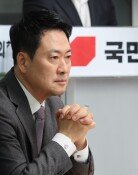GNP head denounces election scandal
GNP head denounces election scandal
Posted August. 31, 2000 21:01,
Lee Hoi-Chang, president of the Grand National Party (GNP), said Thursday that his effort to achieve "symbiotic politics" with the government party have led nowhere because the latter failed to respond in good faith to his bid, which even invited, according to him, criticism that he was acting unlike an opposition party leader. During a press conference given on the second anniversary of his assuming the top post of the GNP, Lee made this remark when asked if his taking to the street to protest against the ruling party contradicted his earlier claim to a new political paradigm of bipartisan partnership on key issues.
Lee is credited with having overcome a succession of political crises in his own party since he returned to lead the GNP through its national convention held August 31, l998. Turmoil developed over alleged donations from industrialists to his campaign fund through the good offices of some tax officials and the nomination of party candidates for the National Assembly in February this year. Political analysts agree Lee¡¯s surviving these challenges served to lay the groundwork for his potential victory in the next presidential race.
Critics argue that he shows a meager capacity for tolerance and inclusiveness, arbitrariness in running party affairs and a negative approach to relations with North Korea. However, his close colleagues and aides point to the unusual success of the latecomer to the political arena despite his lack of an organizational base or political funds at his disposal. Thus, they say, the political experiment of Lee has progressed to a new and higher phase with passing years.
Excerpts from his press interview follow:
Question: What will you do in the regular session of the National Assembly opening this week?
Answer: The attempt of the government party to cover up and paper over electoral irregularities is an act breaching the Constitution; the National Assembly could hardly do anything properly to redress the misdeeds of the government on the floor unless the problem is resolved.
Q. The GNP is blamed for offering no alternative, worthy of a would-be ruling party, to the policy of engagement toward North Korea now being implemented by the government.
A. Our party is being criticized for no fault of its own. We raised a number of questions about the incumbent administration`s policy execution after the inter-Korean summit. We believe it put the cart before the horse, so to speak, in dealing with Pyongyang. So, it does not hold water for the critics to blame the GNP instead of the ruling party.
Q. What is your position on the National Security Law?
A. The divided and dual structure of the Korean Peninsula needs to be recognized. The two consist in an edifice of defense to protect South Korea against an existing entity which may attack the Republic of Korea and a system of dialogue with that entity based on cooperation. The National Security Law is part and parcel of the former, and advocates of its abolition are ignorant of the stark reality of the dual structure.
Q. What is your view on linking the repatriation of South Korean prisoners of war and civilian abductees now being held in North Korea?
A. The return of those innocent captives must be demanded without regard for any military talks. Linkage of the two might offer a clue to a solution, but the humanitarian repatriation of captives should not be sought in return for other concessions.
Q. How do you view the reduction of the recent military maneuvers here?
A. It was wrong for the government to keep the press from even reporting on the scaling down of the Ulji Maneuvers. A great degree of prudence was deemed necessary under circumstances where the South and the North were warming together for reconciliation. But inter-Korean rapprochement needs not preclude security preparedness on our part.
Q. Do you think strongman Kim Jong-Il, chairman of the North Korean National Defense Commission, has changed?
A. I cannot say for sure because I have not met him in person. A cautious approach is required. I hope he has changed.




![“잠만 자면 입이 바싹바싹”…잠들기 전에 이것 체크해야 [알쓸톡]](https://dimg.donga.com/c/138/175/90/1/wps/NEWS/IMAGE/2026/02/23/133404749.3.jpg)


